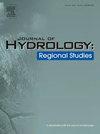Enhancing runoff simulation by combining superflex with deep learning methods in China's Qinghai Lake Basin, Northeast Tibetan Plateau
IF 4.7
2区 地球科学
Q1 WATER RESOURCES
引用次数: 0
Abstract
Study region
The Qinghai Lake Basin on the Northeast Tibetan Plateau.
Study focus
Coupling physical models with deep learning methods offers potential advantages for runoff simulation, optimizing their interaction remains a crucial challenge. This study investigates hybrid models combining the Superflex hydrological model with Gated Recurrent Unit (GRU) for runoff modeling and simulation in the Qinghai Lake Basin. Our approach leverages Superflex as a pre-training step for the neural networks and incorporates key process variables from the physical model as inputs to the network, creating a physically-driven deep learning framework. We systematically explore various input-output combinations and selections of deep learning models, and comprehensively evaluated the most effective configuration for this specific basin. Furthermore, we use the SHAP method to reveal how meteorological factors influence runoff and their complex relationships, making the results interpretable.
New hydrological insights for the region
Compared to hydrological model, hybrid models significantly improve performance by incorporating internal hydrological variables and meteorological data as input features, reducing the error by over 50 % in Buha River Basin. We further observed that although different deep learning architectures exhibit varying performance outcomes, the GRU-based models consistently demonstrated significantly superior predictive capabilities. In addition, we use SHAP to understand the internal operation of the model, revealing how meteorological factors affect runoff and their complex relationships, successfully unveiling the "black box" nature of deep learning models.
基于superflex和深度学习的青藏高原东北部青海湖流域径流模拟研究
研究区域:青藏高原东北部的青海湖盆地。将物理模型与深度学习方法相结合为径流模拟提供了潜在的优势,优化它们的相互作用仍然是一个关键的挑战。研究了将Superflex水文模型与栅极循环单元(GRU)相结合的混合模型在青海湖流域的径流模拟与模拟。我们的方法利用Superflex作为神经网络的预训练步骤,并将物理模型中的关键过程变量作为网络的输入,创建一个物理驱动的深度学习框架。我们系统地探索了各种投入产出组合和深度学习模型的选择,并全面评估了该特定盆地的最有效配置。此外,我们利用SHAP方法揭示了气象因子对径流的影响及其复杂关系,使结果具有可解释性。与水文模型相比,混合模型通过将内部水文变量和气象数据作为输入特征,显著提高了模型的性能,在布哈河流域将误差降低了50% %以上。我们进一步观察到,尽管不同的深度学习架构表现出不同的性能结果,但基于gru的模型始终表现出显著优越的预测能力。此外,我们使用SHAP来理解模型的内部运作,揭示气象因素如何影响径流及其复杂关系,成功地揭示了深度学习模型的“黑箱”性质。
本文章由计算机程序翻译,如有差异,请以英文原文为准。
求助全文
约1分钟内获得全文
求助全文
来源期刊

Journal of Hydrology-Regional Studies
Earth and Planetary Sciences-Earth and Planetary Sciences (miscellaneous)
CiteScore
6.70
自引率
8.50%
发文量
284
审稿时长
60 days
期刊介绍:
Journal of Hydrology: Regional Studies publishes original research papers enhancing the science of hydrology and aiming at region-specific problems, past and future conditions, analysis, review and solutions. The journal particularly welcomes research papers that deliver new insights into region-specific hydrological processes and responses to changing conditions, as well as contributions that incorporate interdisciplinarity and translational science.
 求助内容:
求助内容: 应助结果提醒方式:
应助结果提醒方式:


